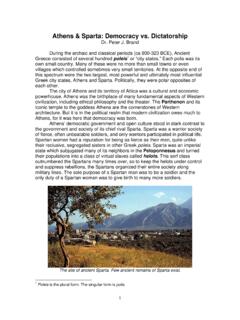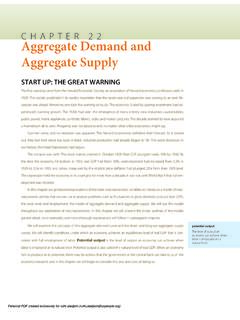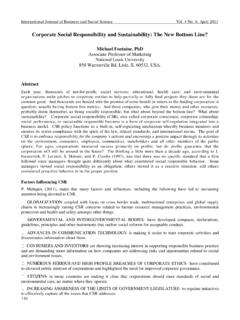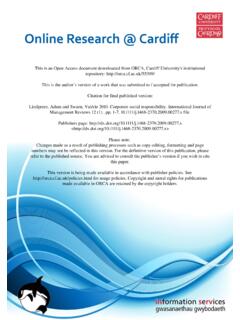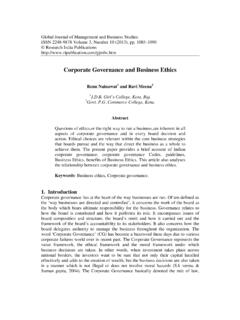Transcription of Corporate Social Responsibility (CSR) Definition, Concepts ...
1 Universal Journal of Management and Social Sciences Vol. 2, ; July 2012 41 Corporate Social Responsibility (CSR) Definition, Concepts and Scope (A Review) *Dr. Muhammad Tariq Khan1, Dr. Naseer Ahmed Khan2, Sheraz Ahmed3, & Mehfooz Ali4 1 Head, Department of Management Sciences University of Haripur, PAKISTAN, 2 Postmaster General, Pakistan Post, Rawalpindi, PAKISTAN, 3 Lecturer Department of Management Sciences, University of Haripur, PAKISTAN, 4 Lecturer Department of Management Sciences, University of Haripur, PAKISTAN Abstract Corporate Social Responsibility (CSR) is a very common term in the Corporate and Social sectors these days. CSR has become so important that many organizations have re-branded their core values to include Social Responsibility . CSR is broadly grounded in an understanding of business being part of society. It has important effects on environmental issues, eradication of poverty, employment creation and labor practices, environmental protection, education and human development.
2 KeyWords: Corporate Social Responsibility (CSR), Society, Social Issues, Organizations 1. Introduction Corporate engagement with society, also termed Corporate Social Responsibility (CSR), has become a commonly used term in contemporary society and refers to one process by which an organization expresses and develops its Corporate culture and Social consciousness (Rupp et al, 2006 and Calderon, 2011). CSR has been receiving lots of attention from various backgrounds of researchers worldwide (Ismail 2011), it has attracted a great deal of attention over the past decade (Zu & Song 2008) and according to some researchers, has gathered great momentum over the past number of years and is now regarded to be at its most prevalent (Sweeney 2007). Therefore business leaders, government officials, and academics are focusing more and more attention on the concept of Corporate Social Responsibility (Reinhardt et al 2008).
3 Almost all Corporate websites/ policies/reports talk about their endeavors for CSR, which has become a way of ensuring that the organization is fulfilling all the obligations towards society and thus is eligible for the license to operate. It assures that the organization can grow on sustainable basis (Sharma et al. 2009). There are also societal pressures with respect to Social issues such as human rights and the environment on the corporations and CSR is widely regarded as the response of corporations to this pressure (Miller & Guthrie 2007) and according to B nabou & Tirole (2009), responding to such pressure, business leaders, governments and academics are now also emphasizing the notion of CSR. In CSR, the central issue is the appropriate role of business that overlaps, almost completely, with its reference area (Reinhardt et al, 2008; BORZA, 2011) and now business organizations have waked up to the need for being committed towards CSR (Sharma et al.)
4 2009) because the role of businesses in society is no longer focused on creating wealth alone but is also focused on acting responsibly towards stakeholders (Abd Rahim, et al, 2011). Everyone agrees that firms should obey the law. But beyond full compliance with environmental regulations do firms have additional moral or Social responsibilities to voluntarily commit resources to environmental protection (Reinhardt et al 2008). To be specific, why companies do CSR (Ismail, 2011)? For this, it is answered that CSR is situations where the firm goes beyond compliance and engages in actions that appear to further some Social good, beyond the interests of the firm and that which is required by law (McWilliams et al 2006) and it is also due to various reasons such as to attract new investors, part of branding strategy, an obligation from the government and the lists go on (Ismail, 2011).
5 However, CSR does not mean just taking part in charitable activities and events; it means holding the Responsibility to develop the society by envisioning future plans for socio-economic justice and be conscious about their Responsibility for the welfare of society around them. Therefore, according to Zu & Song (2008), a large number of companies appear increasingly engaged in a serious effort to define and integrate CSR into all aspects of their businesses. Corporate executives have also encountered demands from multiple stakeholder groups to devote resources to CSR. This may be partially due Universal Journal of Management and Social Sciences Vol. 2, ; July 2012 42 to the pressure generated by a union of ethics-oriented campaigners including NGOs, anti-capitalism activists, labor unions, and news media; and partially due to the demand for doing so by their customers, employees, suppliers, communities, governments, and even stockholders.
6 Ismail (2011) stated that CSR is supported by the case whereby the government alone is definitely cannot afford to have a sole Responsibility in improving the lives of their people as it exceeds their capabilities. If the government is unable to fulfill the increasing demand of their people thus this is where the corporations should support the government. However, those who opposed this statement saw the situation as unfair to the business corporations, such as Friedman s (1970) famous statement that the only Responsibility of a business is to maximize shareholders wealth . But according to Krishnan & Balachandran ( ), companies are beginning to realize the fact that in order to gain strategic initiative and to ensure continued existence, business practices may have to be molded from the normal practice of solely focusing on profits to factor in public goodwill and responsible business etiquettes.
7 An examination of some of the factors, which have led to the development of the concept of CSR, would be ideal starting ground for the conceptual development of suitable Corporate business practices for emerging markets. Krishnan & Balachandran ( ) also expressed that in the last twenty years, there has been a sea change in the nature of the triangular relationship between companies, the state and the society. No longer can firms continue to act as independent entities regardless of the interest of the general public. The evolution of the relationship between companies and society has been one of slow transformation from a philanthropic coexistence to one where the mutual interest of all the stakeholders is gaining paramount importance. B nabou & Tirole (2009) asserted that CSR is somewhat of a catch-all phrase for an array of different Concepts .
8 An analysis of CSR must, therefore, clarify its exact meaning, and in particular the presumed impact of CSR on the cost of capital. 2. History of Concept of CSR CSR, which was previously referred to as Social Responsibility (SR) and today some often call it as Corporate Responsibility (CR) (Ismail, 2011) over the years has gained unprecedented momentum in business and public debate and has become a strategic issue crossing the departmental boundaries, and affecting the way in which a company does business (Sharma et al. 2009). Ma , & al , (2011), referring some studies, expressed that there is an impressive history associated with the evolution of the concept of CSR although it is stated that roots of the Concepts and implementations could be traced back to prehistoric times, generally works on its evolution start with 1950s and 1990s are defined with its popularity and development of similar themes.
9 In 1990s, increasing number of Corporate Social Responsibility reports, standards and code of conduct show the interest for CSR. But Rupp et al (2006) asserted that Corporate engagement with society, also termed Corporate Social Responsibility (CSR) mired in a definitional debate dating back several decades. According to Sriramesh et al (2007), Bowen (1953) offered one of the earliest definitions seeing CSR since then, the field has evolved assuming different names such as Corporate Social responsiveness (in the 1970s) and Corporate Social performance (in the 1980s). This evolution also reflects an increase in awareness in important areas of action and performance that the early definitions had overlooked. Hopkins (2004) is of the view that until 1970s, despite regulation and legislation, business continued largely along an autonomous path, ignoring its critics and listening only to its shareholders, to whom it felt somewhat responsible.
10 But the decade of the 1960s was to be a period of enlightenment for many. Citizens were distrustful of government, business and the undefined establishment . Consumers had grown suspicious of adulterants in their food and dangerous defects in the products they bought. People were becoming aware of the fragile nature of the earth s ecology, while simultaneously becoming more cognizant of human rights. Abd Rahim et al (2011) quoted Carroll (1979) who expressed that CSR has been evolving as early as the 1930s. But Calderon (2011) quoted from book of Zerk (2006) who discussed a more contemporary evolution from the international legal precedents starting visionary employee compensation policies to more complex examples of Corporate citizenship in recent years. In his book Zerk, quoted numerous examples of Corporate initiatives that can be categorized as CSR for instance, in 1914 Henry Ford s employees received higher salaries in 8 hour working days, when the industry standard was 9 hour work days, and in 1935 Johnson & Johnson published a Universal Journal of Management and Social Sciences Vol.






